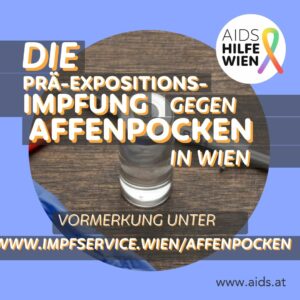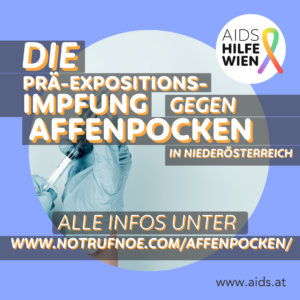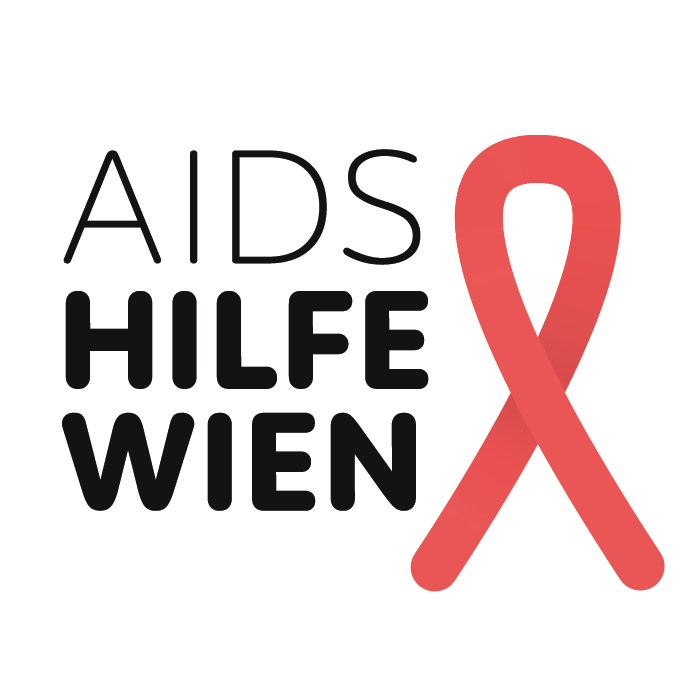
Affenpocken-PrEP-Impfung in Wien
Alle Infos für die Risikogruppen, die Voranmeldung sowie die Termine unter:
https://impfservice.wien/affenpocken/

Affenpocken-PrEP-Impfung in Niederösterreich
Die Impfung kann ohne Voranmeldung jeden Mittwoch zwischen 16.00 Uhr und 18.00 Uhr im Landesimpfzentrum St. Pölten, Adresse: Dr. Adolf Schärf Strasse 10 – Traisencenter, in Anspruch genommen werden.
Alle Infos: www.notrufnoe.com/affenpocken/
What is monkeypox?
Monkeypox is a viral disease (zoonosis) caused by monkeypox virus.
What are the transmission routes?
Person-to-person transmission is possible through direct contact with body fluids or scabs of infected people, as well as through droplet infection (in the early stages of the disease). Transmission can also occur from mother to foetus via the placenta or the birth process.
In the majority of currently known cases, transmission between sexual partners seems to occur through close contact with infectious skin lesions during sex, especially in cases of changing and frequent sexual contact. Investigations into the sources of infection are currently underway.
What are the symptoms?
The incubation period is typically 6-21 days.
Symptoms are initially mainly very non-specific features such as fever, headache, muscle pain, fatigue and swelling of the lymph nodes. After 1-3 days, skin changes develop. Smallpox-typical uniform blisters, pustules and crusts form. However, current cases show these changes (often visible only by 1, 2, 3 vesicles) mainly in the genital area. This is followed by the formation of crusts, which later fall off.
One is also infectious during the non-specific characteristics!
Voriger
Nächster
https://www.youtube.com/watch?v=q0cWTT2sPw4&t=4s
Is there a therapy?
The therapy is prescribed by doctors, the health authorities prescribe quarantine. A vaccine is currently being made available in Austria, which is currently used post-exposure (i.e. if you have had sex with a person who has monkeypox). Therefore, it is important to name the sexual partners when contact tracing. People who were vaccinated against smallpox before 1981 have a high probability of a protective effect.
What should I do if I have changing sexual partners?
It would make sense to at least exchange the contact details of the sexual partners in order to inform each other that an infection has taken place and to be able to inform the contact tracers if necessary. This is the only way to ensure that the post-exposure vaccination or treatment can be used.
What should I do if I suspect I am infected?
Even in the case of non-specific features, such as fever, it is important to follow the general rules that we also know from flu or covid: get well and, if possible, do not infect anyone.
Attention: Although condoms are not sufficient protection, because close (skin) contact in this context is already sufficient for transmission, they are the best protection at this point in time! So use them!
Please call 1450 - they will inform you about the further procedure or contact your general practitioner, HIV or PrEP treatment provider or dermatologist with your suspicion.
Source: Information from the BMSGPK and the City of Vienna
INFORMATION IN Leichter SPRACHE - hier zum Download: WAS SIND AFFENPOCKEN (IN LEICHTERER SPRACHE)
Unser psychologisches Angebot während der Affenpocken-Quarantäne
https://www.youtube.com/watch?v=16JhegdWu6o&feature=youtu.behttps://youtu.be/cw6Yu12hHmchttps://youtu.be/0UP3KoK_hhIhttps://youtu.be/4xqCEYO2jH0https://youtu.be/hRcZgIhVDKAhttps://youtu.be/SUS2RmRV6sAhttps://youtu.be/-sc_e7DPuHghttps://youtu.be/EksHHkh4ExYhttps://youtu.be/6MMhduY-Ukghttps://www.youtube.com/watch?v=NWLpl1zehZc
Information in different languages (thanks to Queerbase and our volunteer Tobi)
Farsi
Spanisch
Polnisch
Arabisch
Bangla
Ukrainisch
Türkisch
Russisch
Weitere Wichtige Ressourcen
Merkblatt des BMSGPK
Infoblatt der Stadt Wien
Wie den Haushalt/das Umfeld Reinigen bei bestätigter Affenpockeninfektion?


